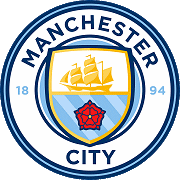
MANCHESTER CITY F.C.
Founded: 1880
Also Known As:
ST. MARK'S (WEST GORTON) (1880-87)
ARDWICK A.F.C. (1887-94)
MANCHESTER CITY (1894-)
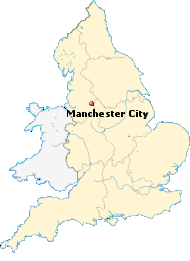
CLICK ON THE MAP TO
VIEW ENLARGED MAP
|
MANCHESTER CITY F.C. (Football Club)
Included Info: Brief History, Club/Stadium Info, Team Jersey & Much More...
BRIEF HISTORY of MANCHESTER CITY FOOTBALL CLUB
(reproduced from 'Wikipedia' pages)
Manchester City F.C. was founded in 1880 as St. Mark's, they became Ardwick Association Football Club in 1887
and Manchester City in 1894. City gained their first honours by winning the Second Division in 1899; with it
came promotion to the highest level in English football, the First Division. They went on to claim their first
major honour on 23 April 1904, beating Bolton Wanderers 10 at Crystal Palace to win the FA Cup; City narrowly
missed out on a League and Cup double that season after finishing runners-up in the League but City became the
first club in Manchester to win a major honour. In the seasons following the FA Cup triumph, the club was dogged
by allegations of financial irregularities, culminating in the suspension of seventeen players in 1906, including
captain Billy Meredith, who subsequently moved across town to Manchester United. A fire at Hyde Road destroyed
the main stand in 1920, and in 1923 the club moved to their new purpose-built stadium at Maine Road in Moss Side.
In the 1930s, Manchester City reached two consecutive FA Cup finals, losing to Everton in 1933, before claiming
the Cup by beating Portsmouth in 1934. During the 1934 cup run, Manchester City broke the record for the highest
home attendance of any club in English football history, as 84,569 fans packed Maine Road for a sixth round FA
Cup tie against Stoke City in 1934 a record which still stands to this day. The club won the First Division
title for the first time in 1937, but were relegated the following season, despite scoring more goals than any
other team in the division. Twenty years later, a City team inspired by a tactical system known as the Revie
Plan reached consecutive FA Cup finals again, in 1955 and 1956; just as in the 1930s, they lost the first one,
to Newcastle United, and won the second. The 1956 final, in which Manchester City beat Birmingham City 31, is
one of the most famous finals of all-time, and is remembered for City goalkeeper Bert Trautmann continuing to
play on after unknowingly breaking his neck.
After relegation to the Second Division in 1963, the future looked bleak with a record low home attendance of
8,015 against Swindon Town in January 1965. Two seasons later, in 196768, Manchester City claimed the League
Championship for the second time, clinching the title on the final day of the season with a 43 win at Newcastle
United. Further trophies followed: City won the FA Cup in 1969, before achieving European success by winning the
European Cup Winners' Cup in 1970, beating Górnik Zabrze 21 in Vienna. City also won the League Cup that season,
becoming the second English team to win a European trophy and a domestic trophy in the same season. The club
continued to challenge for honours throughout the 1970s, finishing one point behind the league champions on two
occasions and reaching the final of the 1974 League Cup. The final trophy of the club's most successful period
was won in 1976, when Newcastle United were beaten 21 in the League Cup final. A long period of decline followed
the success of the 1960s and 1970s. The club were twice relegated from the top flight in the 1980s (in 1983 and 1987),
but returned to the top flight again in 1989 and finished fifth in 1991 and 1992 under the management of Peter Reid.
However, this was only a temporary respite, and following Reid's departure Manchester City's fortunes continued to
fade. City were co-founders of the Premier League upon its creation in 1992, but after finishing ninth in its first
season they endured three seasons of struggle before being relegated in 1996. After two seasons in Division One,
City fell to the lowest point in their history, becoming the second ever European trophy winners to be relegated
to their country's third league tier.
By 2008, the club was in a financially precarious position. Thaksin Shinawatra had taken control of the club a year
before, but his political travails saw his assets frozen.[26] Then, in August 2008, the club was purchased by the
Abu Dhabi United Group. The takeover was immediately followed by a flurry of bids for high profile players; the club
broke the British transfer record by signing Brazilian international Robinho from Real Madrid for £32.5 million.
Continued investment in players followed in successive seasons, and results began to match the upturn in player quality.
City reached the 2011 FA Cup Final, their first major final in over thirty years, after defeating derby rivals Manchester
United in the semi-final. They then defeated Stoke City 10 in the final, securing their fifth FA Cup, the club's first
major trophy since winning the 1976 League Cup. On the last day of the 201011 season, City passed Arsenal for third
place in the Premier League, thereby securing qualification directly into the Champions League group stage. On the last
day of the 201112 season, City scored two goals in injury time including one scored almost five minutes after normal
time had elapsed resulted in an almost-literal last-minute title victory, City's first in 44 years, and became only
the fifth team to win the Premier League since its creation in 1992. Chilean Manuel Pellegrini, who boasted a far more
impressive Champions League record but less of a reputation for trophy-winning became the new manager for the 2013-14
season. In Pellegrini's first season, City won the League Cup and regained the Premier League title on the last day
of the season.
|
CLUB FACTS & INFORMATION
| Official Name
| --
| Manchester City F.C. |
| Club Nickname
| --
| City |
| Year Founded
| --
| 1880 (137 years ago) |
| English County
| --
| Greater Manchester |
| Current Ground
| --
| Etihad Stadium |
| Ground Location
| --
| Manchester, England |
| Club's Owner
| --
| City Football Group |
| Club Chairman
| --
| Khaldoon Al Mubarak |
| Current Manager
| --
| Pep Guardiola |
| Current League
| --
| Premier League |
| Last Season
| --
| Premier League, 3rd place |
HOME COLORS

Sky Blue & White |
AWAY COLORS

Black w/Sky Blue Trim |
|
| |
INTERESTING STADIUM FACTS & INFORMATION

ETIHAD STADIUM
CITY OF MANCHESTER STADIUM
Etihad Campus, Ashton New Road,
Manchester, M11-3FF, England
OPENED: ......... July 25, 2002
SURFACE: ........ Desso GrassMaster
COST: .............. $112 Million
CAPACITY: ...... 55,097
RECORD: ......... 47,435 (2012 vs Queens Park Rangers)
OWNER: ........... Manchester City Council
OPERATOR: ..... Manchester City F.C.
FIELD SIZE: ..... 115 x 74 yards (105 x 68 meters)
|
|
|
HOME JERSEY
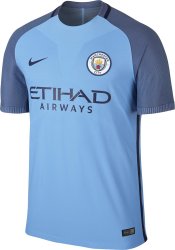 |
AWAY JERSEY
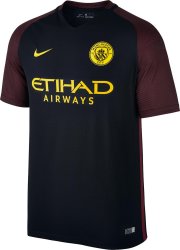 |
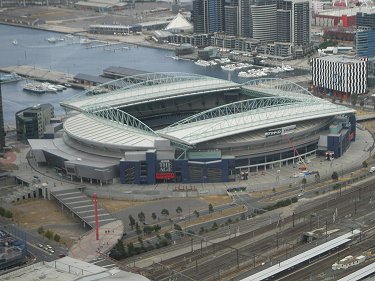
Click On Aerial Photo To View/Download Enlarged Image
|
Etihad Stadium (Manchester City) Seating Diagram
Click On Diagram Below To Enlarge View
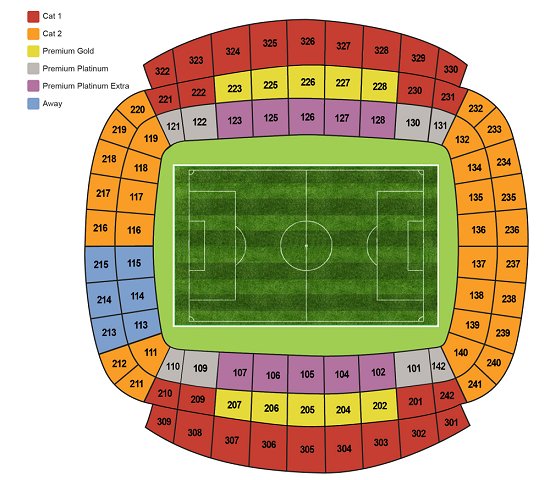
|



MANCHESTER CITY STADIUM WALLPAPERS (Free Download)
Wallpaper Size below is 800x600: To Download Bigger Sizes, Click On Any Button Shown Above
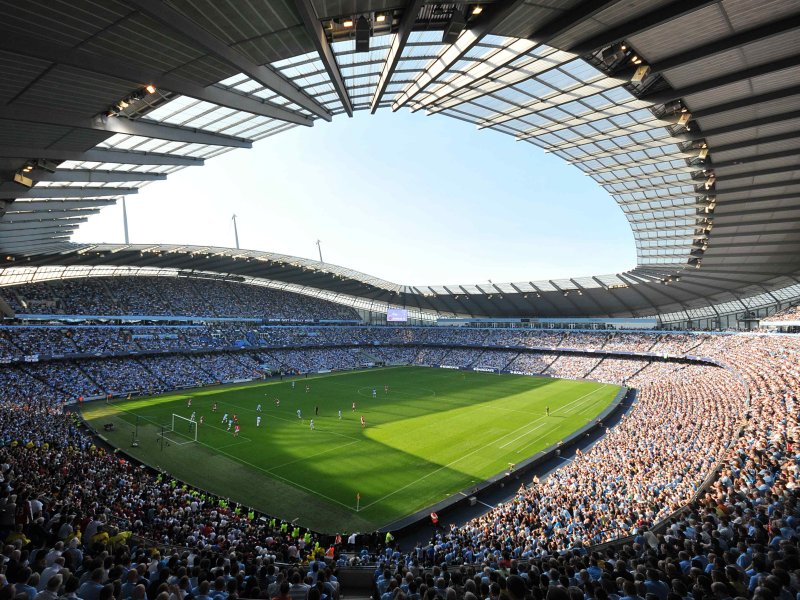
|
|

